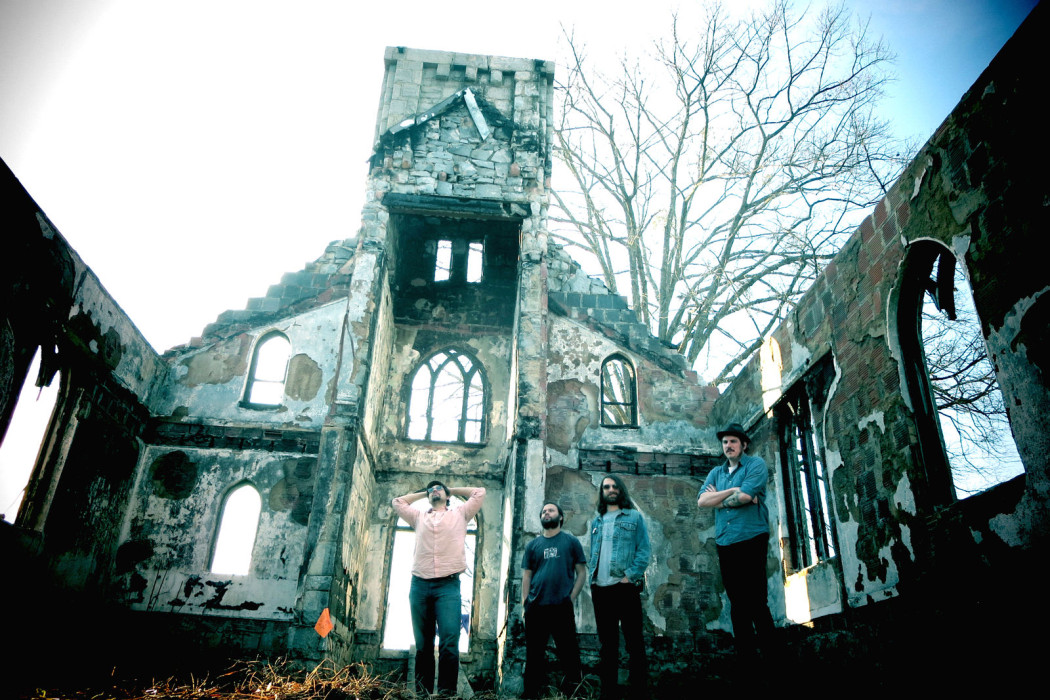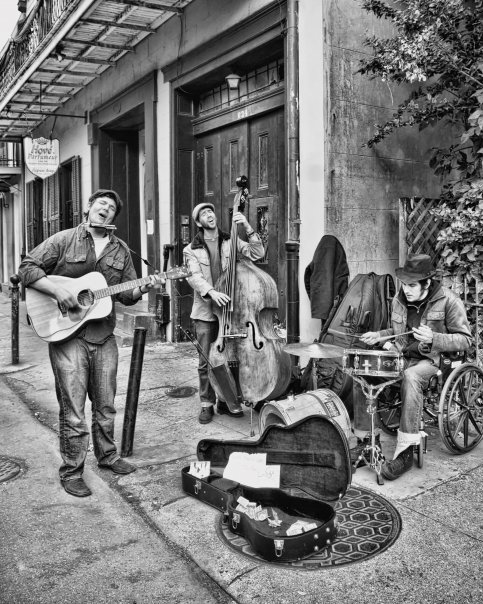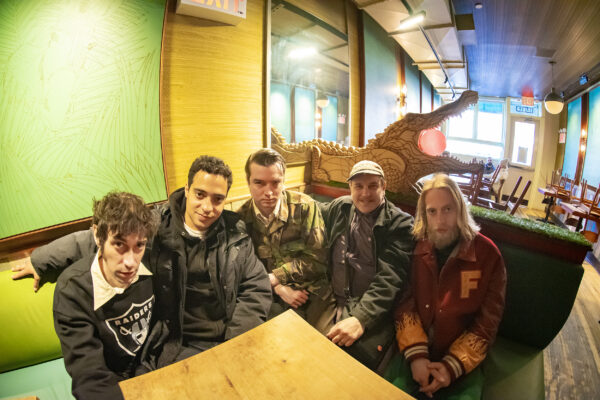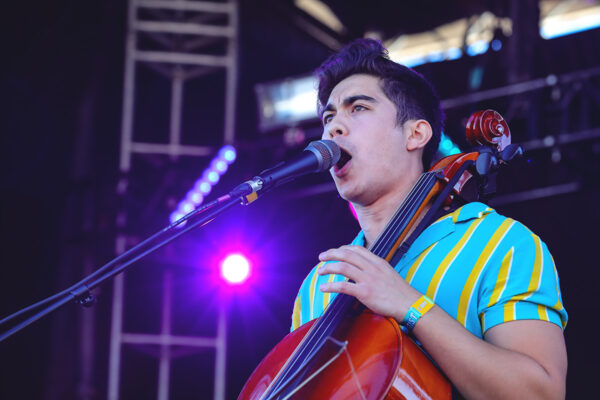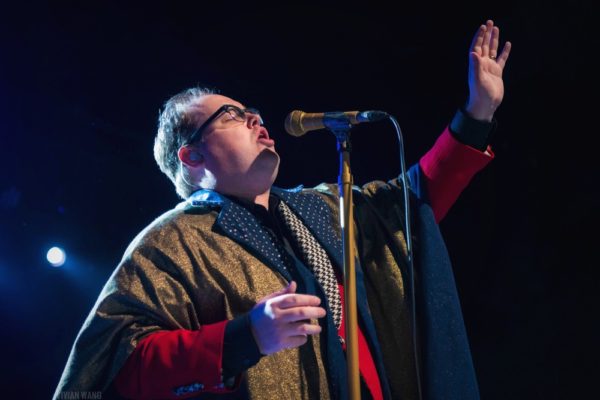Since the late 2000s, Philadelphia based band TJ Kong and the Atomic Bomb have popularized a gritty, bluesy sound built on storytelling. Mirroring the septic intentions of the characters they craft, their music is a whirlwind of darkly hued melodies that are deliberately softened by an underlying humor and wit.
In mid-October, lead singer Dan Bruskewicz sat down with Pancakes and Whiskey, eager to talk about his writing, the recording process and the state of the music business. He also discussed how his band’s annual Halloween performance has gradually evolved, transforming from another nighttime show into a yearly gathering that symbolizes the Philadelphia scene’s steady growth and family atmosphere.
You’ve previously talked about initially considering a career as a writer. When you were a kid what came first- playing music or writing stories?
When I was a kid? I went outside and I played baseball.
Well whenever you started writing then (laughs).
I didn’t start writing music until I was twenty-six, I guess, very late in my creative endeavors. So it was always just writing. I went through high school writing and I went to college for writing. Specifically, screenwriting and playwriting. And then after college I was writing for a few years, doing different gigs and trying to work my way up in that world.
The music started to be a thing that people wanted to see more of, other than going to open mics and tiny gigs and playing. And so I just started going where the demand was, really. There seemed to be more of a demand for that.
There is a rhythm and a lyrical quality to a lot of fiction writing. In that sense, would you even regard the two as separate interests?
The two being what?
Literature and music writing, I feel like they’re tied together in a lot of ways.
Yeah, I think that all writing is tied together in a lot of ways. I think you make a conscious decision with an idea or with a feeling as far as what kind of writing it’s going to come out as. Specifically, songwriting is so different from prose. It’s just a different structure. Prose is structured in a way that tends to be very traditional in many ways, and songwriting has a little more freedom in that regard.
It’s also just a different sample size- you’re getting to the beginning, middle and end a lot quicker in a song than you are in a piece of prose. And it’s just that all of the signifiers and the way to get you to those parts of the piece are a lot quicker and more immediate in a song.
As far as lyrics go, it can be similar to writing prose sometimes, but really it’s just about the melody and it’s about the song structure, and it’s about serving that with lyrics. With prose, you’re serving the story with the lyrics of the prose, but the weight is a little more even on that scale. The lyrics of the prose are almost as important as the style and the story itself. Whereas I think in a song, the song structure and the melody far outweigh the words in a lot of ways.
I’m a very lyrical guy, I like to listen to very lyrical performers. So not that I’m discounting lyrical content, but a lot of lyrical content can mask a really well thought-out melody and song structure, in ways that make you not think about the genius of that part of the song. In other ways, bad lyrical content can also be masked by really good melodies and song structures. Like a Bob Dylan song. He had some really, really wonderful, underrated melodies that people don’t often credit him for, they’re just like, “He’s a lyrical master.”
Well, there are a lot of poetic singer-songwriters who never saw the light of day because their melodies were nowhere near as accessible. And they were just like potato chips- they were easy to digest and delicious and very simple. And the hooks were really good. It just so happen that he was also, you know, a crazy poet.
You’ve talked about being disheartened by the way the writing business operates. Aside from that, was there any specific record or musician that made you want to change course?
No, there was no specific record. I had just been doing it for a while on my own, writing songs as a hobby because I was always very, very into music. I always loved listening to music, and using music as part of my writing process for the dramas and the films that I always worked on. And so eventually I started toying around with the guitar and with writing lyrics and writing melodies and stuff. It was more around that time. There was no a-ha moment or a-ha song.
At one point I was writing a little bit everyday, it just started to happen everyday that I wanted to. And it was just organic that I felt the desire to sit down with the guitar, take a break from what I was doing and just work without really thinking too much about songs, sort of as a breather from the other work I was doing. And that time spent started to become larger and larger.
I started to have more of a desire to put more thought into it and make this stuff that I was just coming up with off the top of my head more well formed. And then that just organically led me to want to perform it out in front of people. It was a very organic, ball-rolling-down-the-hill situation. There was no one moment, it was just a very organic, slow-moving thing that’s still sort of moving that way.
Do you ever find yourself taking any characters or themes from the stories you wrote and turning them into songs?
No, but the feeling is there. I mean, I do that without really trying to do it. There aren’t any characters or any scenes from any of the plays that I wrote from the years that I was doing that. There’s nothing from that in any of the songs but there is a lot of that feeling in them.
I’m curious about your take on iTunes. On the one hand, it’s a great tool for young bands trying to build a fan base, but in another way, it’s the equivalent of buying one chapter out of a book.
How do you mean?
As an artist, you make this album and it’s meant to be listened to from start to finish, in a certain sequential order. And then if you can just buy one song, you’re not getting the full experience of what the artist made. So to me, it’s sort of like you can go through and buy chapter five, and you only read chapter five. You’re not really getting the full experience of something. But then on the other hand, for young bands coming up it’s probably much more natural for somebody to just want to dip their toe in the water- to buy one song instead of maybe committing to a whole album from somebody that they don’t really know if they like yet.
Yeah, I agree with that wholeheartedly. I think that on a third level, it could be cool and it often is, when, to use your example, an author writes his work chapter-by-chapter and sells it chapter-by-chapter. If he sells chapter five first and that’s all you have, then you have to come back in and buy chapter six or chapter four. What if people created and sold their work that way?
Itunes is sort of ciprocal. It’s giving back to AM radio when artists would just put out a single with a B-side. And then they’d put out, very popular artists at least, the next month’s or in the next couple months they’d put out anther single, another B-side. They would just continue that.
There wasn’t really a desire for LPs as much with popular artists because it was radio play that was driving all of the consumption. With iTunes and Spotify and streaming capabilities and the different things that keep popping up every single day because it’s still so new, I just think that it’s coming ciprocally back to that idea. It’s not radio anymore, it’s not curated by an outside source, you’re curating it. But the demand seems to still be one song at a time, and I don’t necessarily think that’s a bad thing.
It’s very difficult to make an LP that’s a work of art, that’s like, “I want to listen to the entire thing.” I feel like that’s not an easy thing to do. And if that is the only way that music is bought and sold, which I think it was for fifteen or twenty years, I don’t think that’s as interesting. I’m interested in the way that iTunes and Spotify can affect the way that we write and sell music. It’s kind of cool to think about it as just making a year’s worth of singles…making twelve singles and selling them every month. That’s interesting to me- to think of it outside the lines that we had been thinking of it.
You’ve previously stated that the band came together very quickly, beginning with a jam session between you and drummer Dan Cask. How much of the TJ Kong sound and aesthetic was born right then and there?
I’d say eighty percent of it. It was another organic thing. The band has been pretty organic, so far. That particular meeting was the first big a-ha moment. If there was one, that would be it…the different elements coming together and beginning to see what it could be if we really wanted to make it a thing, instead of just doing it in our spare time.
For me at least, that was an a-ha moment. Just seeing what different elements we could bring and how that could really draw interest to the product as a whole. I’d say that was a big moment in rounding out exactly what the band does.
Where does the name TJ Kong and the Atomic Bomb come from?
The name comes from one of my favorite movies of all-time, it’s called Dr. Strangelove. The character TJ Kong is the pilot of the airplane that drops the bomb and he rides the bomb at the end, if you remember.
There’s a great black and white photo of the band playing in the streets of the French Quarter. How many times have you been to New Orleans?
I’d say we’ve been there six times, maybe.
To tour?
Yeah, we’ve always gone on tour. We’ve had two bassists in the band and the first bass player had spent many years living in New Orleans. We went back with him and he showed us around, and we played on the street where that photo was taken. That photo has a funny story because it was taken by a Philadelphia photographer named Lisa Schaffer. She’s actually very prolific in Philly. And we didn’t know Lisa at the time. She knew who we were, but she didn’t know us by sight.
That was Mardi Gras weekend, we went for Mardi Gras that first time we visited. She was down there for Mardi Gras, too. We didn’t know, and we had never met her. She knew who the band was, but she didn’t know us by sight. We were just playing on the street and she was just out taking pictures. She took that picture and then many months later, she posted it. And we were like, “What the fuck?!” It was a very strange, funny happen-stance.
The way I think of the environment in New Orleans, is that there’s an ache that accompanies the splendor that surrounds you there. I think it has that in common with the music that you write. Did you always set out to create that contrast with your music?
It’s not the intent. The intent is just to write a good song, and I think the songs that come out just have a lot of ache. They’re blues songs, so they come out that way. The one intent, if we have any intent at all with writing the songs, is to make it in the moment and make it an experience that we could produce in a live setting. To make people experience it in the moment in ways that we’ve noticed aren’t happening as much in rock and roll anymore. Not that I dislike it. There are a lot of modern trends that I really like in rock and roll, but a lot of them seem to be more and more along the lines of creating a performance that people can watch and not judge, but watch and experience in a way that’s less visceral. The audience is less apart of it, and more noticing it. Do you know what I mean?
Yeah.
It’s becoming more like art. It’s geared toward being, seeing and then studied or seen and then talked about, and less about everyone experiencing it in the moment like a piece of drama or a piece of performance art, which I think in a way it had been. That’s definitely an element that we try to bring back to it.
All the songs I write we bring to the band and then we come up with a way to make them work in a live setting to make people want to experience it and be there in the moment with us as we’re playing, instead of only listening and watching. That is what New Orleans means to me as well. That had a big effect on me, going down there. And we do try to bring some of that to the songs. If there’s ache in them, that part isn’t as much design- that’s just what comes out with the blues songs that we write. The in the moment part is definitely something that we try to produce.
The band has been very successful in capturing a very gritty, raw sound in the studio. What’s the recording process like?
As I said, we came to this pretty late, or at least I did. I came to music very late, this is the first band I’ve ever been in. I’ve never really done any of this before. It’s always been a DIY way of doing things. As I said, it’s been very organic and we haven’t really been trying to bite off more than we can sell. So we have only been producing for the audience we’ve had. I feel like that’s been a very positive and successful way for the band to go about doing things. We’ve only set out to sound how people have basically demanded that we sound, or how we notice people enjoy that we sound…that combined with the little bit of intent that we have.
We’ve never really tried to set out and make a record that will wow you in any technical way. We’ve only set out to make the songs sound sort of like they do in a live setting, which is where we found all of our followers. In that way, we’ve gone about recording in a backwards, DIY sort of way. If you think about records as something just to sell at the live shows, rather then records that are like, “This is the identity of the band,” it brings it to another fun place of thinking about recording. And I think we are beginning now to have mastered that way, after doing it for like five years, of recording in a way that captures that sound. But also maybe we can begin to bring it to that other level of it being it’s own product and being a little bit more of a work of thought and a work separate from the live show.
We’ve been basically just recording with the intent of having it be like another element of the live experience. I think in that way, all the recordings sound pretty gritty and very live. And we’ve always recorded live, we’ve never really done a lot of multi-tracking. The first record we did some multi-tracking and it just didn’t feel right for the band. It sounds good, but it just wasn’t feeling right. We found that what is best for our band is just doing everything live and making it sound real and working from there at the base.
You’ve had the opportunity to play in many different states. What do you think separates the Philadelphia music scene from other cities?
Philly is one of the more incredible music scenes in that it’s very, very diverse. At the same time, there’s a very real community feeling to it that I haven’t found in any other town that we’ve played. Even New Orleans, you go there and there’s definitely a community feel, but folks are still more or less in their own little parts of the community. They’ll venture out, of course, and go to other shows but they’ll stay within their genre within their group of friends. There’s not a whole lot of the entire town coming together and doing things. Whereas in Philly, it’s very strange. I feel like it’s come to a point where the entire town has started to go out and do things together.
Just over the past ten years, the music business in Philly has come so far. The people that live here and work here in the business tend to almost treat it as a family, and something we all share. So it’s all sort of been here doing this little Renaissance that’s happening in Philly. I feel like we all want to see that get bigger and bigger, so we all support it in a way that I don’t see in any other town. It’s amazing, really.
In many ways, Philly can be a very standoffish place, but the people who make music are super communal and there’s no sense of, “Well I do this type of music” and “He does that type of music, so we would probably never work together.” There are no boundaries. Everyone hangs out, everyone bounces ideas off of each other, everyone goes to each other’s shows. We all communicate with the same channel and on the same networks and go to shows and hang out. I think because it started so small and has gotten so large in the last five-ten years, we still keep that small family idea apart of the large business that’s starting to come through town.
Maybe that’s only a little honeymoon that’s happening now and as it gets bigger that will wear off, but at the moment we’re just at a very cool place where we’re beginning to get some recognition from outside town. And big bands are coming through here on an everyday basis. People know that there’s money and not only fans, but working-class musicians in town. But at the same time, it’s not to the point where everyone is so jaded or busy with their own business. It’s still very supportive and family oriented, which is lovely.
The end of the month will mark the band’s fifth annual Halloween show, which has become almost a showcase for all these other great local bands, not just yourselves. Did you always plan to have them every year?
It wasn’t a plan, but it was the type of thing where when we did the first one we were like, “Oh this could easily be something that happens every year.” So it was definitely an idea, but it wasn’t planned that way. At the time we didn’t really know how many of the bands that we had at the first one would even be around after a couple years.
And that’s sort of held true- bands come and go. But at the same time, there’s still that interest that I was just talking about, to keep it a very communal thing. And bands still want to come together and play these communal shows and be able to create a larger thing than they could ever create themselves. And that’s really the Philly scene in a nutshell. I feel like this little Halloween tradition has sort of fed off of that growth and become something that we can do every year to have as a spotlight on what Philly does, which is very cool.
You’ve said that being a fan of Patti Smith made you seek out some of the musicians and authors that she was inspired by. If you could pick, what writer or musician would you hope that a fan of your own music would be inspired to take an interest in?
When I was in high school, listening to music became a huge thing for me. I would go off and listen and then I would go away and read. They started to meld together, of course.
In high school you start to notice the difference between the artists you like and what they listened to and what they read. I probably never would have had an interest in French poetry, for example, in high school. That would have come way later. But because of Patti Smith and Dylan and a lot of other people, I got into those worlds. So I guess if someone in high school or middle school were listening to TJ Kong…(laughs). You’re asking-
What would you find exciting that someone got into as a result of listening to TJ Kong?
I guess I’d have to say Eastern philosophy or something (laughs). That would be amazing. Well, I don’t know, I can’t really connect my music to any particular writer or genre of writing. But if someone was like, “Hey I listened to TJ Kong the other night and then I really got into Eastern philosophy,” that wouldn’t make any sense, but it would be amazing (laughs).
It would be amazing if our music could inspire people to get into the other worlds that I really enjoy, like film and theater. To get into drama and the cinematic details that are in our songs. If they went back and started to look through the cinematic things that everyone in the band really loves. So if it brought people to the film world that we all enjoy, I think that would be amazing.
Article by: Caitlin Phillips

